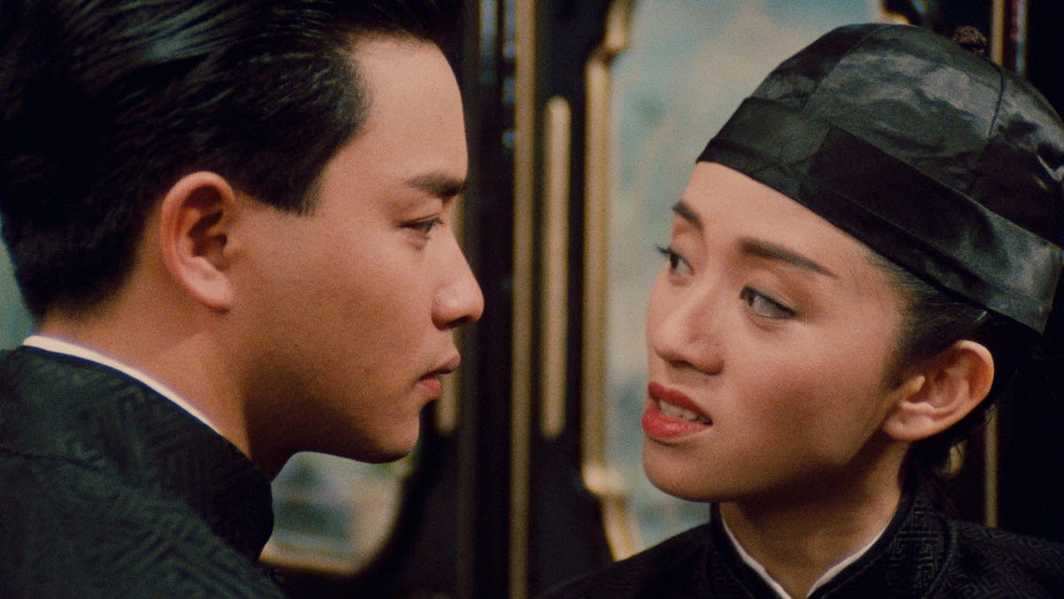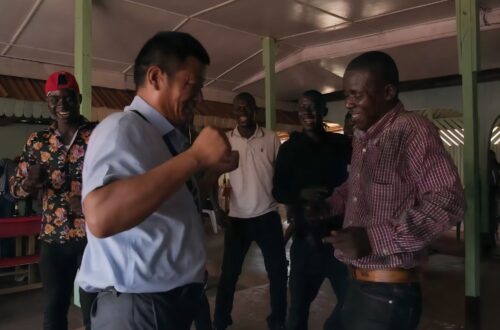‘Rouge’: Nostalgia and loss in two long-gone Hong Kongs
As it moves back and forth between two time periods, "Rouge" is a mix-up of genres, spinning and twisting the conventions we expect out of stories about ghosts, love affairs, and rose-tinted period pieces.

On June 21, Stanley Kwan’s arthouse ghost story Rouge (胭脂扣 yānzhī kòu) (1987) was given a second life by the Criterion Collection with a 4K digital restoration on home video. As a sorrowful romance that pays homage to the Hong Kong of the 1930s, Rouge is old enough now that watching it evokes another layer of nostalgia. The film was released during Hong Kong cinema’s golden age, and features two of the era’s most beloved stars: Leslie Cheung (张国荣 Zhāng Guóróng) and Anita Mui (梅艳芳 Méi Yànfāng), singers-turned-actors who coincidentally both met tragic ends in 2003, with Cheung committing suicide and Mui passing away from cervical cancer. In Rouge, the legendary pair play Fleur (Mui) and Chan Chen-Pang (Cheung), a courtesan and playboy who pledge eternal love to one another.
The film opens in 1934 in the neighborhood of Shek Tong Shui, at the time a popular red-light district of Hong Kong. In the area’s opulent brothels, rich young men like Chen-Pang pass the days with courtesans, opera, and opium. Although the heir to his father’s herbal business, Chen-Pang has little interest in work or doing what his family wants. He hears Fleur singing while climbing up a staircase and falls in love when he comes face-to-face with her. They’re soon inseparable, and with Fleur’s encouragement, Chen-Pang pursues his dream to become an opera actor.
The difference in the lovers’ social standings is a big issue, however. Chen-Pang’s parents demand that their son come home and get married to a respectable woman of their choosing. Madly in love, Chen-Pang and Fleur would rather commit suicide than separate. Coming together for the last time, they drink wine and eat heaps of raw opium, dying in each other’s arms. At least, that’s how Fleur remembers it. When she arrives in the underworld, Fleur’s partner is nowhere to be found. After half a century of waiting, Fleur returns to the human world to discover what happened.
The Hong Kong of 1987 is baffling to a ghost who dons a cheongsam and has never heard of Coca-Cola. Fleur is brought to tears with how much the place has changed. Her favorite theaters and restaurants are replaced with convenience stores and shopping malls. Her brothel has been turned into a kindergarten. A journalist couple, Yuen (Alex Man 万梓良) and Shu (Irene Wan 温碧霞), serve as Fleur’s guide to the modern world. They’re everything that Chen-Pang and Fleur weren’t: boring, ordinary, and glued to their jobs. There’s nothing passionate or colorful about their lives, and they’re fully aware of the fact. But they are touched by Fleur’s story, and agree to help her look for her lost love.
Anita Mui’s pale, gloomy gaze dominates Rouge, and while tragic at its heart, there’s a playfulness to the film that still feels fresh today. As it moves back and forth between two time periods, Rouge is a mix-up of genres, spinning and twisting the conventions we expect out of stories about ghosts, love affairs, and rose-tinted period pieces. Fleur isn’t anything like the special effects-driven phantoms who haunted the action and horror films of the time. When a skeptical Shu first meets Fleur, she asks why the ghost can’t fly through walls or suck blood. While Fleur might be a spirit, she has a physical body and her energy is quickly wearing out. The most she can do is creep around Hong Kong, reminiscing and lamenting.
During the late-’80s and ’90s, Hong Kong filmmakers anxious over their home’s approaching handover to China explored their feelings through movies about alienation, nostalgia, and loss. Rouge hits all these boxes, and Fleur might be regarded as a stand-in for Hong Kong, returning to a home that’s distant, uncomfortable, and even incompatible. Kwan would further ponder the complexities surrounding reunification in his documentary Still Love You After All These (念你如昔 niàn nǐ rú xī) (1997), a rare short also included on Criterion’s new DVD/Blu-Ray, along with his queer-themed history of Chinese film, Yang + Yin: Gender in Chinese Cinema (男生女相:华语电影之性别 nánshēng nǚ xiāng: huáyǔ diànyǐng zhī xìngbié) (1996). Rouge’s themes aren’t any less relevant today, and its unforgettable lead and eclectic style make for an immortal piece of filmmaking.






